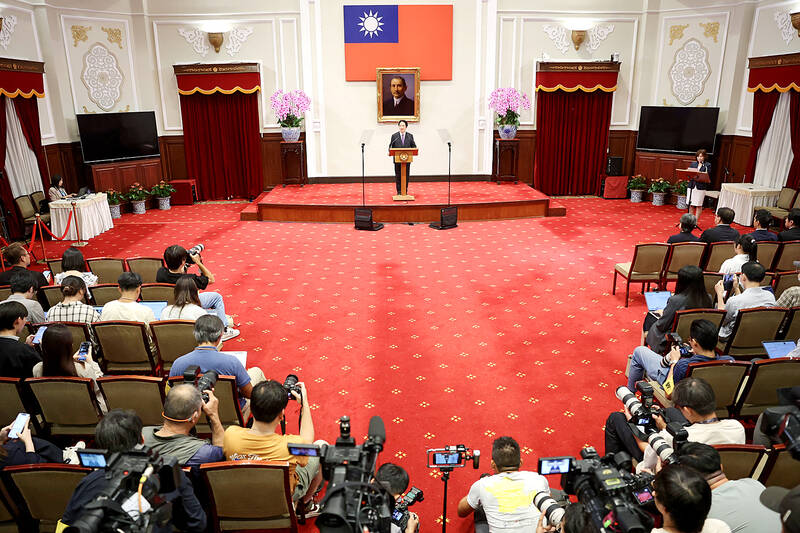Media reports alleging that President William Lai (賴清德) used vulgar language during a news conference was disinformation intended to harm the president’s reputation, the Presidential Office said yesterday.
The rebuttal came days after Lai on Saturday evening at a news conference responded to a reporter’s request for comment on Chinese Nationalist Party (KMT) Chairman Eric Chu’s (朱立倫) calls to release Taiwan People’s Party founder Ko Wen-je (柯文哲) from detention, where he is being held as part of a corruption investigation.
Some social media influencers and pundits over the following days alleged that using lipreading Lai could be seen cursing away from the microphone.

Photo: CNA
Presidential Office spokeswoman Karen Kuo (郭雅慧) said the office condemns the reports as fabricated with the malicious intent of damage Lai’s character.
Numerous reporters can testify that he did not curse in the news conference, which was broadcast live, she said.
A cybersecurity expert said the story was tailor-made to spread rapidly through social media with the objective of being reported in traditional media.
The source of the story originated from “zombie accounts” on the platform Threads, they said.
A user with the handle kbkbkb0404 wrote on Threads that Lai’s cursing could be discerned using closed-captioning generated with artificial intelligence, while another user with the account henrysnight wrote that Lai glared at the Television Broadcasts Satellite reporter who asked the question.
The kbkbkb0404 account had been silent for a year, while the henrysnight account had just 57 upvotes, suggesting the accounts were part of a manipulation campaign, the expert said.
TV pundits screenshotted and aired posts, they said, adding that Beijing-owned content farm TaiwanHot was notably among the first to share the report.
Multiple problematic accounts also boosted the story on Taiwan’s popular online bulletin board system Professional Technology Temple, in patterns suggestive of a coordinated campaign, they said.

A preclearance service to facilitate entry for people traveling to select airports in Japan would be available from Thursday next week to Feb. 25 at Taiwan Taoyuan International Airport, Taoyuan International Airport Corp (TIAC) said on Tuesday. The service was first made available to Taiwanese travelers throughout the winter vacation of 2024 and during the Lunar New Year holiday. In addition to flights to the Japanese cities of Hakodate, Asahikawa, Akita, Sendai, Niigata, Okayama, Takamatsu, Kumamoto and Kagoshima, the service would be available to travelers to Kobe and Oita. The service can be accessed by passengers of 15 flight routes operated by

MORE FALL: An investigation into one of Xi’s key cronies, part of a broader ‘anti-corruption’ drive, indicates that he might have a deep distrust in the military, an expert said China’s latest military purge underscores systemic risks in its shift from collective leadership to sole rule under Chinese President Xi Jinping (習近平), and could disrupt its chain of command and military capabilities, a national security official said yesterday. If decisionmaking within the Chinese Communist Party has become “irrational” under one-man rule, the Taiwan Strait and the regional situation must be approached with extreme caution, given unforeseen risks, they added. The anonymous official made the remarks as China’s Central Military Commission Vice Chairman Zhang Youxia (張又俠) and Joint Staff Department Chief of Staff Liu Zhenli (劉振立) were reportedly being investigated for suspected “serious

ENHANCING EFFICIENCY: The apron can accommodate 16 airplanes overnight at Taoyuan airport while work on the third runway continues, the transport minister said A new temporary overnight parking apron at Taiwan Taoyuan International Airport is to start operating on Friday next week to boost operational efficiency while the third runway is being constructed, the Ministry of Transportation and Communications said yesterday. The apron — one of the crucial projects in the construction of the third runway — can accommodate 16 aircraft overnight at the nation’s largest international airport, Minister of Transportation and Communications Chen Shih-kai (陳世凱) told reporters while inspecting the new facility yesterday morning. Aside from providing the airport operator with greater flexibility in aircraft parking during the third runway construction,

American climber Alex Honnold is to attempt a free climb of Taipei 101 today at 9am, with traffic closures around the skyscraper. To accommodate the climb attempt and filming, the Taipei Department of Transportation said traffic controls would be enforced around the Taipei 101 area. If weather conditions delay the climb, the restrictions would be pushed back to tomorrow. Traffic controls would be in place today from 7am to 11am around the Taipei 101 area, the department said. Songzhi Road would be fully closed in both directions between Songlian Road and Xinyi Road Sec 5, it said, adding that bidirectional traffic controls would